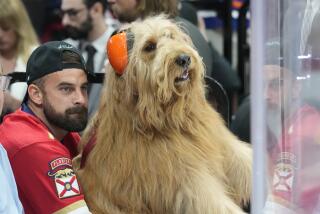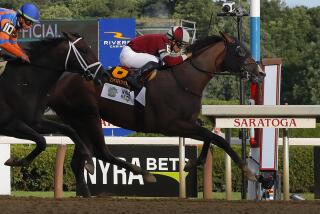Iditarod: Dog love, miracles and, oh yes, youngest winner ever
The Iditarod, the grueling, frozen, 975-mile race between Anchorage and Nome that is the world’s premier sled-dogging event, is over. And 25-year-old Dallas Seavey has made history, becoming the youngest-ever winner of the event.
“I’m feeling a little tired and very elated,” he told an Iditarod TV crew as he pulled in Tuesday night after nine days, four hours and 29 minutes on the trail. The route offers the equivalent of running from Portland to Los Angeles — with a few steep mountain trails, frozen lakes and bone-chilling windswept plains thrown in.
Seavey, a light, powerful former championship wrestler who ran alongside the sled when going up hills, quickly hugged his dogs. They were wrapped in garlands and glory at the finish line, then moved quickly on to dinner and a nap.
The young champion from Willow, Alaska, was joined in the race by his father, Mitch Seavey, who won in 2004, and his grandfather, Dan Seavey, 74, who competed in the legendary event’s inaugural run. In apparently typical family form, however, each of the tough competitors was tight-lipped about strategy -- and out to try to win the race.
“He wants to be Dallas Seavey, not Mitch Seavey’s son,” his father told the Alaska Dispatch.
Seavey finished at 7:29 p.m., an hour ahead of the Iditarod’s most-celebrated female racer, Aliy Zirkle, 41, a biology graduate and former U.S. Fish and Wildlife Service employee who now runs sled dogs full time out of Two Rivers, Alaska. In 2000, she became the only woman ever to have won the possibly even-more-grueling Yukon Quest race, also held in Alaska.
The race was marked, as always, with tales of grueling hardship, miraculous escapes — and this year, apparently, a lot of doggy sex. Several of the competitors were in heat during the race, including four-time former champion Lance Mackey’s key dog, Maple, who inspired her male team members to moon at her instead of running during parts of the race.
In one of a series of lively blog dispatches from the race, this one titled “When Puppy Love Goes Wrong,” Anchorage Daily News reporter Kyle Hopkins described the plight of Alberta musher Karen Ramstead, who had seven dogs in heat.
“Unfortunately, every time we stop, things go wrong very quickly,” said Ramstead, who had to pause twice during the race to sit out what she called “ties” before moving on. “I wouldn’t want to explain it too graphically,” she told Hopkins.
Then there was Ramey Smyth, who the Daily News reported fell asleep and fell off his sled on the first day of the race, forcing him to hitch a ride with a competitor and chase his dogs for 40 minutes before catching up.
That wasn’t Smyth’s only disaster: Several of his dogs fell ill after apparently eating some bad poultry skins; one of them had to be pulled out of the race for emergency treatment for symptoms of pneumonia, probably contracted after aspirating its own vomit.
There were two miracles.
The first happened to Scott Janssen, the owner of an Anchorage funeral home who calls himself the “Mushing Mortician.” Janssen and the team were making their way down a steep section of the Dalzell Gorge when his 9-year-old husky, Marshall, suddenly dropped in his tracks, by all appearances, dead.
“I know what death looks like, and he was gone. Nobody home,” Janssen told the Daily News. But by quickly administering mouth-to-snout CPR and rubbing the dog’s chest vigorously, Janssen said, the animal suddenly revived — and the Daily News has this heartwarming video of Marshall’s triumphant return to Anchorage (this time as a passenger, not a puller.)
“I was sobbing,” Janssen said. “I really love that dog.”
Then there was the dog that held back Bruce Linton’s runaway sled team, after Linton was knocked off the sled. As Jill Burke of the Alaska Dispatch relates the story, Linton found the dog well up ahead holding back the rest of the team with a single line — wrapped around its neck. The dog was lying motionless in the snow, but somehow was revived.
Chief veterinarian Stu Nelson had only one explanation, the Dispatch said: “God’s looking out for him.”
ALSO:
Pi Day: Why are we transfixed by the delicious mystery of pi?
As Lewis-McChord boosts help for troubled vets, another arrest
Gettysburg shop yanks bobblehead doll of assassin John Wilkes Booth
More to Read
Sign up for Essential California
The most important California stories and recommendations in your inbox every morning.
You may occasionally receive promotional content from the Los Angeles Times.









